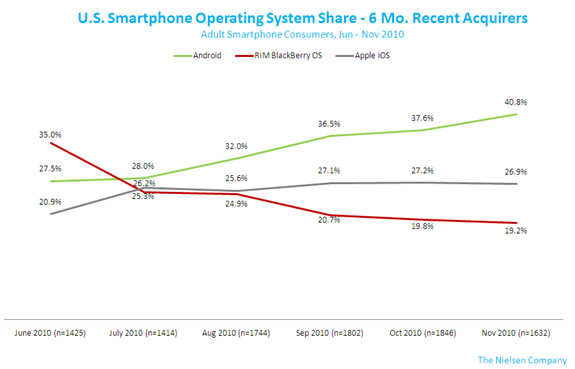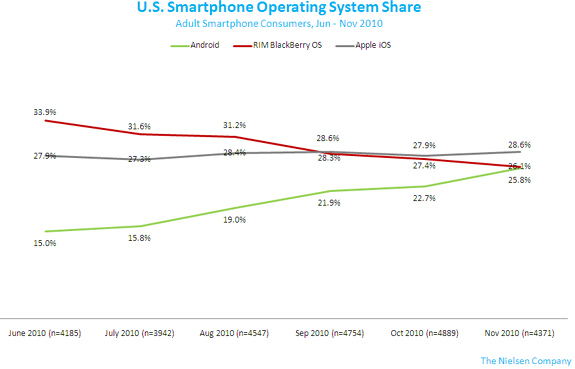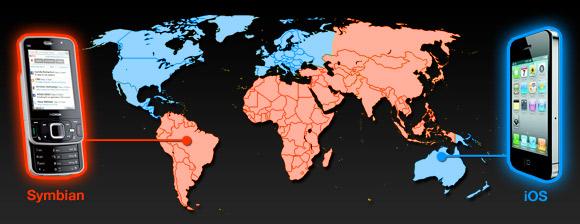According to a new report by Nielsen, in the month of November sales of phones from all Android licensees together made up the largest segment by platform among "six month acquirers," with 40.8 percent of "adult smartphone customers" buying phones running Android.
Apple's share of these 'recent adult acquirers' was reported to be significantly less, at 26.9 percent, although Apple's assigned share had grown over the previous six months from 20.9 percent in June 2010, prior to the launch of iPhone 4.
RIM's BlackBerry platform came in third among 'recent adult acquirers,' making up 19.2 percent of the market, a significant drop from its 35 percent high in June. RIM's lost 15 percentage points appeared to be gobbled up by both Apple (which grew by 6 percentage points over the same period) and Android (which grew by 13).
However, the report notes that, "when it comes to overall consumer market share, Android OS (25.8%) is still behind Apple iOS (28.6%)." RIM figures in-between iOS and Android, with a 26.1 percent share of the overall market.
Apple's overall share of the smartphone market was up just over a percentage point across the last six months, while Android grew by nearly 11 percentage points and BlackBerry fell by nearly 8 percentage points.
Lies, Damn Lies and Statistics
Nielson's latest figures contradict the notion that Android as a platform has already outpaced Apple's iOS in the US and globally, an idea that has gained populist traction despite the poor performance of Google's Android Market and the lack of support it is getting from key third party developers.
An earlier report by Gartner claimed Android shipments world wide had ballooned from 3.5 percent last year to a whopping 25.5 percent in the third quarter of 2010.
Gartner's data didn't show that growth coming from mainstream Android licensees such as Samsung, HTC and Motorola, however, instead crediting Android with tens of millions of units from "other" manufacturers.
Gartner's numbers differed from a parallel IDC mobile phone market report by an astounding 77 million units (the smartphone market itself is currently only 81 million), casting a credibility shadow over Gartner's figures and reporting.
Gartner's reliance on assumptions that high volume sales of no-brand phones in emerging markets are likely using Android actually spells problems for Android licensees in leading nations, as those volumes of phones do not add value to the platform's app market but may be contributing downward pricing pressure for licensees who are relying upon Android to deliver an affordable product.
A flood of tens of millions of Android phones by "other" manufacturers can only impede the global sales of HTC, Motorola and Samsung models while subtracting from the differentiated value those brands can deliver. HTC and Samsung have recently chosen to also release new Windows Phone 7 models, and Samsung launched its own Bada platform this summer in a hedge bet against Android, both indications that hardware makers are not comfortable with putting all their eggs in Google's basket.
Who's on first?
Another metric of smartphone sales and use, based on web share, was also recently used to suggest that RIM's BlackBerry platform had surged ahead of Apple's iOS in the US.
The surge appeared to be related to RIM's rollout of its first WebKit browser, and only appeared when the use of iPod touch devices were excluded from the platform tally. Globally, the StatCounter figures showed that Apple had taken over the top position in 30 countries, including all of North America, Europe and Australia. The second runner up was Symbian, with RIM's BlackBerry only taking a lead in South America and Android only leading in Samsung's home nation of South Korea.
A third metric, looking at mobile activations, was also recently used to suggest that Android had eclipsed iOS as a platform. Google began reporting activations earlier this year, with Apple taking issue with the numbers Google had announced and reporting that it was still ahead in September and again in October. Despite giving its software away, Google still don't appear to have eclipsed Apple in activations even with its 300,000 per day number reported last month.
A fourth metric, based on ad impressions cited by third party ad networks, assigned Apple's iOS and Google's Android a tied position at 37 percent of all smartphones last month. In that report, by Millennial Media, segregates "connected devices" into its own market segment apart from smartphones and simpler feature phones. Apple iOS makes up a large percentage of these "connected devices," which include the iPod touch and iPad.
 Daniel Eran Dilger
Daniel Eran Dilger









-m.jpg)






 Malcolm Owen
Malcolm Owen
 William Gallagher
William Gallagher
 Charles Martin
Charles Martin
 Christine McKee
Christine McKee
 Wesley Hilliard
Wesley Hilliard

 Andrew Orr
Andrew Orr








107 Comments
This Dilger kid is more prolific than L. Ron Hubbard. LOL.
This Dilger kid is more prolific than L. Ron Hubbard. LOL.
FUD and more FUD... as the war intensifies there will be more and more FUD from the companies and supporters [on edit - and detractors] involved.
I do think, though, that Apple may have to shorten their cycle... one new phone per year may not cut it.
FUD and more FUD... as the war intensifies there will be more and more FUD from the companies and supporters involved.
I do think, though, that Apple may have to shorten their cycle... one new phone per year may not cut it.
exactly right on.
also they need to look at he jailbreak apps to see what people "want" they have lots of cool things cooking
This Dilger kid is more prolific than L. Ron Hubbard. LOL.
That is one word for him. I think he is the most warped, bias blogger there currently is on the internet. He gives this site a BAD name. He should stick to his lame blog.
Once again, DED looks at a study and totally misinterprets the data. Android has surpased the iPhone in new sales. It's third place in market share only reflects the relative newness of the platform's popularity and it will almost certainly be in the top spot in another 6-12 months as more contracts expire on older BB devices and as more people get their first smart phone.
Also, why repeat the false interpretation of the Gartner data? They did not clain there were tens of millions of no name android phones. That came from a complete idiot not knowing how to read and interpret the data they published. Publishing this foolish crap makes AI look bad and the author look worse.